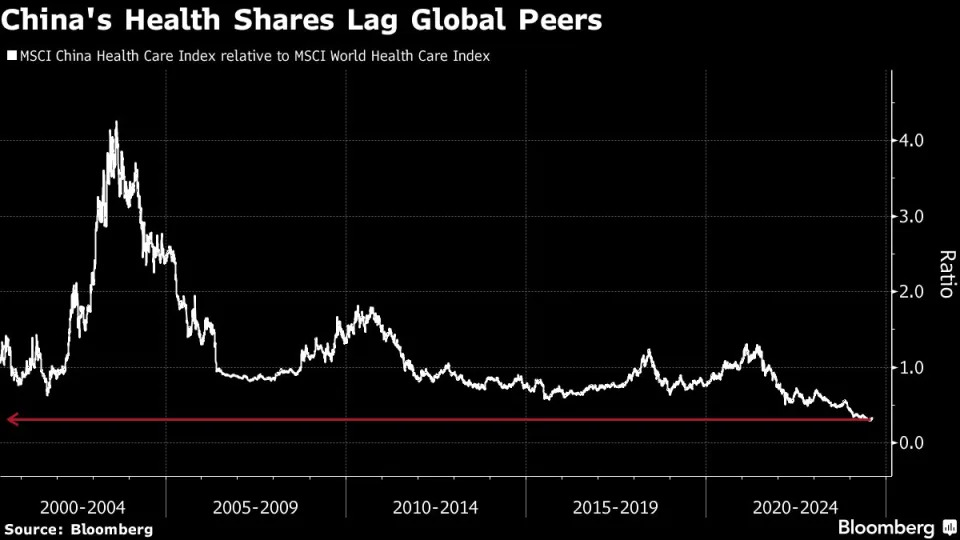China’s health stocks tipped for rebound on valuations, Fed bets
(Bloomberg) — A rotation into defensive shares coupled with supportive government policies is boosting the appeal of underperforming Chinese health-care stocks.
Signs of improving sentiment are emerging after the MSCI China Health Care Index’s ( ^722071-USD-STRD , ^722071-USD-NETR , ^722071-USD-GRTR ) 23% slide this year. New measures by Beijing to boost the sector and expectations for Federal Reserve interest-rate cuts provide scope for a rebound as the gauge trades near a record low relative to global peers, according to data compiled by Bloomberg.

“We remain positive toward the outlook for quality players in selective sub-sectors like medical equipment and drug innovation within the China health-care space,” said Jim Jiang, Asian equities investment manager at abrdn.
A nascent recovery in China’s health shares started in July as investors sought out undervalued corners of the stock index, with MSCI’s China health sub-gauge outperforming its broader benchmark. The revival comes after concerns over the US Biosecure Act and Beijing’s sweeping anti-graft clampdown triggered a months-long slump in the sector’s shares.
“We’re becoming more optimistic on pharma,” Morgan Stanley analysts led by Sean Wu wrote in a note. The broker favors Shanghai United Imaging Healthcare Co. and Shenzhen Mindray Bio-Medical Electronics Co. among medical technology shares for their high sales exposure in equipment replacement. It also prefers Alibaba Health Information Technology Ltd. in the Internet health space.
An mpox outbreak adds another layer to investors’ calculus on which of the sector players will quickly respond to the anticipated demand. The World Health Organization declared an outbreak in Africa a global health emergency. That’s pushed shares of some Chinese virus detection kit makers, including Daan Gene Co, higher on Thursday.
Policy Support
China has been rolling out policies to boost health-care firms struggling with a funding crunch, including a pilot program to optimize the clinical trial process for some drugs. The central government last month also signed off on measures aimed at stimulating homegrown biotech innovation, although details have yet to be published.
Such moves bode well for a market that used to be dominated mostly by imported innovative drugs.
They will “reinvigorate some earlier drug development activity and investment,” said Bloomberg Intelligence analyst Jamie Maarten.
The nation’s health companies also continue to ink licensing deals with global pharmaceutical giants. Merck & Co ( MRK ). recently agreed to buy a bispecific antibody from Curon Biopharmaceutical Ltd., while Takeda Pharmaceutical Co. ( TAK ) in June signed an option agreement with Ascentage Pharma Group International for the development of a blood-cancer drug.
In addition, Fed policy easing should support the sector as the performance for biotech and health shares are usually inversely related to US rates, according to Deutsche Bank AG.
“Now with a more aggressive Fed rate-cut road map expected for the rest of 2024, we would expect a sentiment improvement for the health-care sector in the second half,” analyst Cyrus Ng wrote in a note this week.
Still, Chinese health stocks face several challenges. The Biosecure Act, which could ban Chinese biotechnology companies from accessing US contracts, introduces “significant uncertainty this year and beyond,” Maarten said.
A lack of exposure to blockbuster weight-loss drug producers could also continue to leave China’s health stocks behind overseas peers. Eli Lilly & Co ( LLYZ.XC )., which sells obesity therapy Zepbound, holds the largest weighting on MSCI’s global health sub-gauge, while maker of hit obesity drug Wegovy, Novo Nordisk A/S ( NVO ), comes third.
Even so, “China has been investing increasingly into innovative drugs and one cannot rule out the possibility that one day, it could be the Chinese players who can produce something similar,” said Nicholas Chui, an emerging markets equity portfolio manager at Franklin Templeton.
(Includes development on mpox outbreak in the sixth paragraph)




